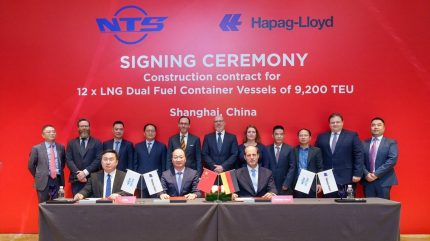
German shipping company Hapag-Lloyd has entered two contracts with Chinese shipyards for a total of 24 new container ships.
Yangzijiang Shipbuilding Group will construct 12 newbuilds, each with a capacity of 16,800 twenty-foot equivalent (TEU).
Another 12, each with a capacity of 9,200 TEU, have been ordered from New Times Shipbuilding Company.
These vessels will replace older units, nearing the end of their service life this decade.
All newbuilds will feature advanced low emission high-pressure liquefied gas dual-fuel engines, which are fuel-efficient.
These vessels can also operate using biomethane, reducing CO2e emissions by up to 95% compared to conventional propulsion systems. The new ships will also be ammonia-ready.
Hapag-Lloyd will take delivery of the new vessels between 2027 and 2029.
The newbuilds will have a combined capacity of 312,000 TEU and involve a combined investment volume of around $4bn. Long-term financing of $3bn has already been committed.
Hapag-Lloyd CEO Rolf Habben Jansen said: “This investment is one of the largest in the recent history of Hapag-Lloyd, and it represents a significant milestone for our company as it pursues the goals of its Strategy 2030, such as to grow while also modernising and decarbonising our fleet.
“Operating a fleet of more efficient vessels will also enhance our competitive position, and thanks to the increase in capacity, we will continue to offer our customers a global, high-quality product.”
Hapag-Lloyd is dedicated to the 1.5-degree target of the Paris Agreement.
By 2030, the company aims to reduce its fleet’s absolute greenhouse gas emissions by around one-third compared to 2022, moving towards net-zero fleet operation by 2045.
Hapag-Lloyd’s recent decision to retrofit five vessels to methanol propulsion, announced in April 2023, is another step in its efforts to prepare for a multifuel future.
The company’s controls 287 modern container ships with a total transport capacity of 2.2m TEU. Additionally, it operates the largest fleet sailing under the German flag.
Last month, Hapag-Lloyd christened Hamburg Express, the eponymous flagship of its new class of container ships.



